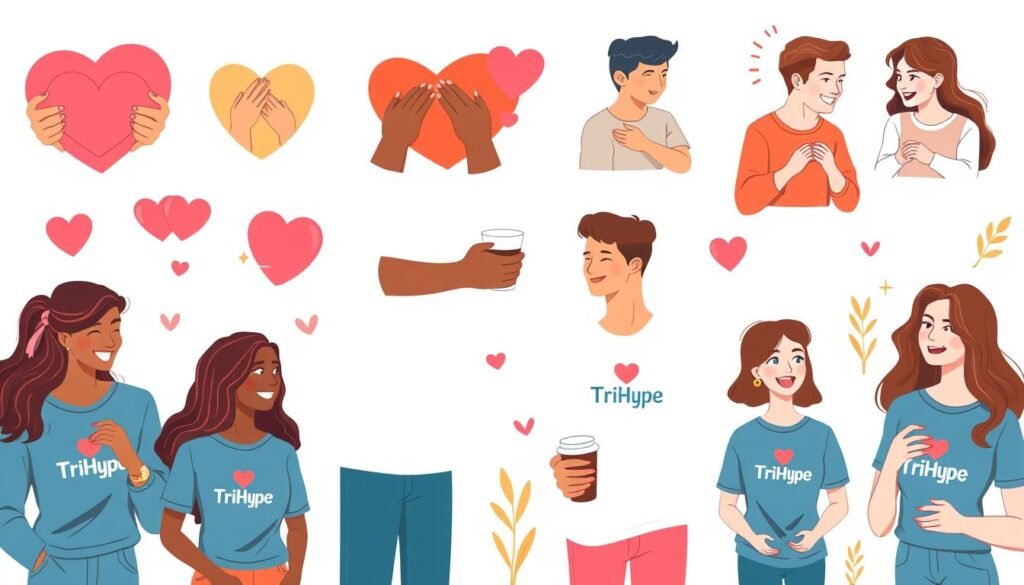Maya Angelou once said, “The main thing in one’s own private world is to try to be an honest, decent, good human being.” This idea is true for our personal lives and our closest relationships. We’ll look at the key signs of a strong, healthy partnership. These signs include trust, respect, and feeling good emotionally between partners. Signs of a healthy relationship are what we gonna learn about today.
Key Takeaways
- Identify the key characteristics of a healthy relationship, including open communication, mutual respect, and emotional support.
- Understand the importance of building trust and honesty in a relationship.
- Learn to recognize the signs of a positive, fulfilling partnership, such as shared interests, effective conflict resolution, and quality time together.
- Discover how to maintain a healthy relationship through commitment, effort, and a focus on intimacy and affection.
- Recognize unhealthy patterns and take steps to address them for the betterment of the relationship.
What is a Healthy Relationship?
A healthy relationship is built on mutual understanding, respect, and care. It’s about a deep emotional bond where both feel supported and valued. They can express themselves freely. At its core, it’s about open communication, shared values, and caring for each other’s feelings.
Defining Key Characteristics
Healthy relationships have many key traits. Some of the most important include:
- Open and honest communication, where both feel heard and understood
- Mutual respect, where each person’s boundaries and needs are respected
- Shared interests and values, which create a sense of purpose and connection
- Emotional support and understanding, where partners empathize and offer compassion
- Healthy boundaries and personal space, allowing for individual growth and fulfillment
Importance of Emotional Wellbeing
Emotional well-being is key to a relationship’s health and success. When partners support each other emotionally, they build trust and intimacy. This helps them face challenges together. By focusing on emotional well-being, couples can build a strong bond to overcome obstacles and grow together.
| Characteristics of a Healthy Relationship | Importance of Emotional Wellbeing |
|---|---|
|
Emotional well-being is vital for trust, intimacy, and resilience in relationships. Prioritizing emotional support helps partners face challenges better and grow together. |

“A healthy relationship is not about two people becoming one. It’s about two people coming together to build something greater than the sum of its parts.”
Open Communication
Effective open communication in relationships is key to a healthy partnership. We’ll talk about the need for honest talks, listening well, and sharing our feelings without fear. We’ll look at effective communication strategies to make our connections stronger.
Communication goes both ways, and it’s important for both people to feel heard. Active listening means we try to understand the feelings and views behind the words. This helps us respond with empathy and find solutions, even when things get tough.
Trust and respect are vital for open communication. When we feel safe sharing our thoughts, we connect deeper and handle problems better. Using good communication methods helps our relationships grow and keeps us emotionally healthy.
| Open Communication Strategies | Benefits |
|---|---|
| Actively listening to your partner | Promotes understanding and empathy |
| Expressing your feelings and needs openly | Fosters trust and emotional intimacy |
| Avoiding criticism and contempt | Maintains a constructive dialogue |
| Practicing reflective listening | Ensures mutual understanding |
“The biggest communication problem is we do not listen to understand. We listen to reply.”
By embracing open communication in relationships and using effective communication strategies, we can make our partnerships stronger and more rewarding.

Mutual Respect and Trust
Mutual respect and trust are key to a healthy relationship. When partners show respect through actions, it builds trust and honesty. These are vital for a relationship’s success and happiness.
Building Respect Through Actions
Respect isn’t just about being polite or avoiding hurtful words. It’s about showing care and admiration for your partner. This means listening well, keeping promises, and being reliable.
It’s also vital to respect each other’s boundaries and personal space.
Fostering Trust and Honesty
Trust is crucial for a strong relationship. Partners must feel safe sharing their true selves. They should trust that their thoughts and feelings will be understood and judged kindly.
Building trust means talking openly and honestly. It takes time and effort but is key for a relationship’s health.
Without respect and trust, relationships can feel insecure and lead to resentment. By focusing on these values, couples can build a strong bond. This bond helps them face life’s challenges together.

“The glue that holds all relationships together – including the relationship between the leader and the led – is trust, and trust is based on integrity.” – Brian Tracy
Signs of a Healthy Relationship
Knowing the signs of a healthy relationship is key to a lasting partnership. Emotional support and shared interests are key signs of a strong bond. Let’s look at the main signs of a healthy relationship.
Open Communication
Good communication is the base of a healthy relationship. We should be able to share our thoughts and feelings freely with our partner. It’s important to understand each other and solve problems together.
Mutual Respect and Trust
Healthy relationships are built on respect and trust. We should feel valued and supported by our partner. Respect shows in actions, like respecting each other’s boundaries and supporting each other’s dreams.
Emotional Support and Understanding
In a healthy relationship, we count on our partner for emotional support. This means being there for each other in good and bad times. Offering empathy and a listening ear is important.
Shared Interests and Values
Sharing common interests and values makes a relationship stronger. Doing things we both like can bring us closer. Having similar values, like family or personal growth, also strengthens our bond.
Healthy Boundaries and Personal Space
It’s important to have healthy boundaries in a relationship. We should be able to pursue our own interests and grow as individuals. But, we also need to make time for each other.
Intimacy and Affection
Being close emotionally and physically is key in a healthy relationship. We should feel okay with showing love and having our intimacy needs met in a good way.
By noticing these signs, we can build and keep a fulfilling relationship.
| Signs of a Healthy Relationship | Description |
|---|---|
| Open Communication | Comfortable expressing thoughts, feelings, and needs openly and honestly with partner |
| Mutual Respect and Trust | Feeling valued, supported, and accepted by partner; honoring each other’s boundaries and goals |
| Emotional Support and Understanding | Offering empathy, compassion, and a listening ear during both joyful and challenging times |
| Shared Interests and Values | Engaging in mutually enjoyable activities and aligning on core values |
| Healthy Boundaries and Personal Space | Respecting each other’s individuality and need for personal space while making time for the relationship |
| Intimacy and Affection | Feeling comfortable expressing affection, both physically and emotionally |

“The foundation of a healthy relationship is built on mutual understanding, respect, and a willingness to compromise.”
Emotional Support and Understanding
Building a strong relationship is more than just sharing hobbies or respecting each other. It’s about deep emotional support and understanding. Emotional support in relationships is key. It makes a safe place for talking openly, being vulnerable, and sharing empathy and compassion.
Empathy and Compassion
Being able to empathize with your partner and show real compassion is vital. Empathy and compassion in relationships help you understand and accept your partner’s feelings. This makes your bond stronger.
- Practicing active listening to understand your partner’s perspective
- Acknowledging and validating their emotions, even if you don’t fully agree
- Offering comfort and support during tough times
- Putting yourself in your partner’s shoes to better comprehend their experiences
Creating a culture of empathy and compassion makes your partner feel safe to share their needs and fears. This leads to deeper intimacy and emotional safety in your relationship.
“The greatest gift you can give another is the purity of your attention.” – Richard Moss
At the end, emotional support and understanding are key to a healthy relationship. By focusing on empathy, compassion, and really listening to your partner, you build trust, vulnerability, and growth together.
Shared Interests and Values
Successful relationships are built on shared interests and values. They also rely on being compatible. Having things in common with your partner makes your relationship more intimate and fulfilling.
Sharing hobbies and passions can make your bond stronger. It gives you both something to do together. Whether it’s hiking, trying new foods, or reading, these activities bring you closer.
Being on the same page about important things like family or spirituality helps too. It gives your relationship a sense of purpose. When you share these beliefs, trust and respect grow, making your relationship stronger.
By focusing on your shared interests and values, you and your partner can have a fulfilling relationship. You’ll face life’s challenges together, thanks to your shared experiences. This makes your bond last longer and deeper.

“Compatibility is the foundation of a healthy relationship. When partners share common interests, values, and life goals, the bond between them deepens and the relationship flourishes.”
Healthy Boundaries and Personal Space
Healthy boundaries and respecting each other’s space are key for a strong relationship. We’ll look at how to set and respect individual needs. We’ll also talk about how to keep a sense of closeness and intimacy. Plus, we’ll share ways to communicate and keep healthy boundaries in your relationship.
Respecting Each Other’s Needs
Healthy relationships are built on respect and understanding. This means valuing each other’s need for space and freedom. It’s important to talk about what you need and be ready to find middle ground. Clear boundaries help avoid fights and make sure both feel respected.
Here are some tips for respecting each other’s space:
- Talk openly about what you need from your partner.
- Let each other have alone time or time with friends and family.
- Don’t enter someone’s space without their okay.
- Accept your partner’s boundaries, even if they’re not like yours.
- Work together to find a balance between being close and independent.
Respecting each other’s space and needs helps build a strong, healthy relationship. It’s all about trust, respect, and understanding each other.
| Respecting Personal Space | Invading Personal Space |
|---|---|
| Communicating needs openly | Disregarding partner’s boundaries |
| Allowing alone time or time with friends | Constantly checking in or demanding attention |
| Compromising to meet both partners’ needs | Ignoring requests for privacy or independence |
Effective Conflict Resolution
Relationships aren’t always easy, and conflicts are a normal part of any partnership. Yet, how we handle these disagreements can greatly affect our relationship’s health. We’ll look into effective conflict resolution strategies and communication methods that help couples work through issues and grow closer.
Constructive Communication Strategies
In conflict resolution in relationships, focusing on constructive communication is key. This means:
- Actively listening to your partner’s view
- Using “I” statements to share your feelings, not blame
- Keeping the focus on one issue at a time
- Being open-minded and ready to compromise
- Considering outside help, like counseling, when needed
By using these constructive communication strategies, couples can deal with conflicts in a healthy way. This strengthens their relationship.
| Constructive Communication Techniques | Benefits |
|---|---|
| Active Listening | Helps partners feel heard and understood, reducing conflict escalation |
| Using “I” Statements | Avoids blame and encourages honest and open talk |
| Focusing on One Issue | Keeps conflicts manageable and solves problems better |
| Compromise and Flexibility | Builds mutual understanding and respect, leading to better resolutions |
| Seeking External Support | Brings in an outside view and more tools for solving conflicts |
By using these conflict resolution in relationships strategies, couples can turn disagreements into chances to grow closer. They gain a deeper understanding of each other.
“The greatest weapon against stress is our ability to choose one thought over another.” – William James
Quality Time Together
Spending quality time with each other is key to a strong, happy relationship. Today, with so many distractions and busy lives, making time to connect is crucial. It helps keep the bond strong and brings back the spark that first brought you together.
The importance of quality time in relationships is huge. Being fully present and engaged with our loved ones builds trust and closeness. These moments create lasting memories and strengthen your relationship, helping it last through tough times.
To make the most of quality time in relationships, try these tips:
- Unplug and disconnect from technology: Have “tech-free” times where you can focus on each other without distractions.
- Plan regular date nights or weekend getaways: Make time for special activities together, like a fancy dinner or a weekend adventure.
- Engage in shared hobbies or activities: Find new things to enjoy together or go back to old favorites, deepening your connection.
- Practice active listening: Be fully present, make eye contact, and really listen to what your partner says.
“The greatest gift you can give another is the purity of your attention.” – Richard Moss
Putting quality time in relationships first helps you and your partner feel deeply connected and fulfilled. Embrace the value of giving each other your full attention. This way, you’ll create memories that will support your relationship for many years.
Intimacy and Affection
Intimacy and affection are key to a healthy relationship. We’ll look at both the physical and emotional sides of being close. We’ll see why touch, being open, and sharing feelings are important for a strong bond.
Physical and Emotional Intimacy
Being physically close, like cuddling or kissing, is a big part of many relationships. It makes partners feel close, safe, and comfortable with each other. But, being emotionally close is just as important.
This means sharing thoughts, feelings, and being open with each other. It builds trust and understanding. Having both kinds of closeness makes a relationship stronger and more fulfilling.
It’s important to find a good balance between being physically and emotionally close. Couples should spend quality time together, talk openly, and work on trust and closeness.
| Aspect of Intimacy | Description | Importance |
|---|---|---|
| Physical Intimacy | Includes physical touch, cuddling, kissing, and sexual intercourse | Fosters a sense of closeness, comfort, and safety between partners |
| Emotional Intimacy | Involves the ability to openly share thoughts, feelings, and vulnerabilities | Builds trust, understanding, and a deeper connection between partners |
“Intimacy is not only about physical closeness, but also the emotional connection and vulnerability we share with our partner.”
Recognizing Unhealthy Patterns
Healthy relationships are built on understanding, trust, and respect. It’s key to spot signs of unhealthy patterns early. These signs can mean deeper issues that need help. By catching these patterns early, we can work on them and build a better partnership.
One sign of trouble is when partners don’t talk well or fight a lot. Not sharing thoughts and feelings can lead to resentment and misunderstandings. This can hurt the relationship.
Another warning is when one partner doesn’t respect the other’s limits or opinions. This can show up as belittling or manipulating the other person.
- Emotional tricks like gaslighting or guilt trips can hurt trust over time.
- Trying to control someone or cutting them off from friends is also a bad sign.
These patterns can be tricky and might not be easy to see at first. If you’re facing these issues, getting help from friends, family, or a therapist is key. With support and a willingness to change, you can work through these problems. This can lead to a better and more rewarding relationship.
| Warning Signs of an Unhealthy Relationship | Characteristics of a Healthy Relationship |
|---|---|
| Constant Conflict | Open Communication |
| Lack of Respect | Mutual Respect and Trust |
| Emotional Manipulation | Emotional Support and Understanding |
| Controlling Behaviors | Healthy Boundaries and Personal Space |
Maintaining a Healthy Relationship
Keeping a healthy relationship strong takes a lot of commitment and effort from both people. We’ll look at ways to keep the bond strong, like talking openly, understanding each other, and facing challenges together.
Commitment and Effort
Being in a healthy relationship isn’t easy; it needs commitment and effort from both sides. Couples must put in time, energy, and resources, even when things get tough.
Being dedicated means:
- Prioritizing quality time together
- Actively listening and engaging in open, honest dialogue
- Showing compassion and empathy when the other is struggling
- Compromise and finding mutually beneficial solutions to conflicts
- Continuously learning and growing as individuals and as a couple
When both partners work hard, the healthy relationship can grow strong. Maintaining a healthy, fulfilling partnership requires a shared responsibility and a steadfast determination to nurture the bond over time.
“The secret of a happy marriage is finding the right person. You know they’re right if you love to be with them all the time.”
– Julia Child
Conclusion
Throughout this article, we’ve looked at what makes a relationship healthy. Key signs include open communication, mutual respect, and trust. Emotional support, understanding, and shared interests are also important.
Healthy boundaries, solving conflicts well, spending quality time together, and a strong intimate bond are crucial too. By focusing on these, we can build strong, lasting relationships.
The article’s insights offer a guide for those wanting to improve their relationships. We suggest our readers think about their own relationships. Take steps to build trust, respect, and closeness – the basics of a healthy relationship.
For a lasting relationship, it’s key to focus on growing together, compromising, and caring for each other’s happiness. By paying attention to the signs of a healthy relationship and working on these qualities, we can lay a strong foundation. This leads to a life filled with love and companionship.
